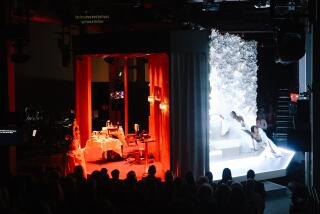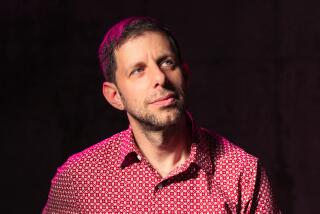UNINTENTIONALLY COMIC PUCCINI : ‘TURANDOT’ CARICATURE REVIVED
- Share via
SAN FRANCISCO — When opera is done well, there is nothing quite like it. It is exciting, uplifting, ennobling. When opera is done badly, there is nothing more ludicrous.
The production of Puccini’s “Turandot” assembled by Terence McEwen at the War Memorial Opera House in 1982 must be the silliest thing this side of the Marx Brothers’ “Trovatore,” and at least the Marxists were trying to be funny. This “Turandot” pays little, if any, attention to the basic conflicts of hate and love and redemption as defined in the literary sources of Schiller and Gozzi. It is content just to be a great big stupid show.
Allen Charles Klein has designed a kitschy-glitz Peking that clutters the stage with steps and pods and screens and quaintly gnarled trees and lanterns and poles topped with severed heads and a huge dragon sculpture that provides a perch for the ancient emperor whose 10-foot beard droops downward like so much tinsel on a Christmas tree. The icy princess of the title seems to dwell in a gigantic bubble--some call it a pearl. Here is gilded dime-store chinoiserie in excelsis.
Bliss Hebert has populated this Technicolored nightmare with a chorus of marionettes that jerk in unison, a platoon of gauzy priestesses and body-stockinged hootchy-kootch dancers with strategically placed baubles, a horde of quasi-nude, well-oiled musclemen masquerading as executioners and torturers and Sumo wrestlers, an army of supernumeraries instructed to look vaguely Oriental and menacing.
A Toscanini in the pit and a Nilsson-Corelli duo on the stage would have trouble defending Puccini against such visual bilge. For the current revival, McEwen couldn’t even find reasonable facsimilies of such musical paragons.
Berislav Klobucar, the Yugoslavian conductor, is a solid routinier who specializes in Germanic challenges. His Puccini is orderly, slow and bloodless. Italianate climaxes are not his forte.
The diabolically difficult title role is being shared this year by Eva Marton and Linda Kelm. Tuesday night, it was Kelm’s turn, and the American soprano again proved that she commands the basic prerequisites: She can sing loud--sometimes softly too--and she can sing long and she can sing high. She doesn’t do any of these things with special distinction or finesse, however, and, dramatically, she still conjures up unfortunate images of a Katisha who has strolled into the wrong mock-Asian charade.
Franco Bonisolli, the narcissistic, matinee-idol Calaf, seemed to be suffering from a cold, which may explain the surprising and welcome restraint that marked much of his singing. Even though not in top vocal form, he still could belt out thrilling high notes and hold them forever. Some of the high notes, incidentally, were actually sanctioned by the composer. When he wasn’t delivering stentorian bravura or swashbuckling in slow motion, he indulged in some less-than-ideal, dusky and husky vocalism. Still, he remains a prime example of a vanishing breed: the hypertenor.
Adriana Anelli made pretty, little-peep sounds as the pathetic slave-girl Liu. John Macurdy was the imposing basso-profondo Timur (has there ever been an unimposing Timur?). The masque trios were dispatched rather innocuously by David Malis, Frank Kelley and Jonathan Green. Daniel Harper inheriting Eddie Albert’s whiskers, intoned the croaking of the old Emperor sweetly.
The principals, it should be noted, paid only perfunctory attention to each other. They were too busy striking poses, screaming and negotiating the set.
Meanwhile, the elegant Tuesday nighters paid little attention to what was passing for musical drama. They were too busy socializing, reading the supertitles and oohing and aahing the scenery. At applause time, they sat on their hands as usual. For once, the response seemed apt.
More to Read
The biggest entertainment stories
Get our big stories about Hollywood, film, television, music, arts, culture and more right in your inbox as soon as they publish.
You may occasionally receive promotional content from the Los Angeles Times.










